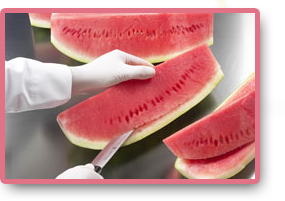Watermelon: The Beta-Carotene & Lycopene
Watermelon is the Lycopene Leader among fresh produce. In addition to its healthy properties and effects on women, children, men and pregnant women, watermelon is an important part of a healthy diet.
Rich in electrolytes and water content, melons are nature’s gift to beat tropical summer thirst.
Watermelons are very low in calories (just 30 calories per 100 g) and fats yet very rich source of numerous health promoting phyto-nutrients and anti-oxidants that are essential for optimum health.
Watermelon is an excellent source of Vitamin-A, which is a powerful natural anti-oxidant. 100 g fresh fruit provides 569 mg or 19% of daily-required levels of this vitamin. It is essential for vision and immunity. Vitamin-A is also required for maintaining healthy mucus membranes and skin. Consumption of natural fruits rich in vitamin-A is known to protect from lung and oral cavity cancers.
Get Green World Becarotene and Lycopene capsule today and get all the benefit in watermelon.
It is also rich in anti-oxidant flavonoids like lycopene, beta-carotene, lutein, zeaxanthin and cryptoxanthin. These antioxidants are found to offer protection against colon, prostate, breast, endometrial, lung, and pancreatic cancers. Phyto-chemicals present in watermelon like lycopene and carotenoids have the ability to help protect cells and other structures in the body from oxygen-free radicals.
Watermelon is an excellent source of carotenoid pigment, lycopene and indeed, superior to raw red tomato. 100 g of fresh melon provides 4532 µg lycopene, whereas only 2573 µg in tomatoes. Studies suggest that lycopene offer certain protection to skin from harmful UV rays.
Watermelon fruit is a good source of potassium; Potassium is an important component of cell and body fluids that helps controlling heart rate and blood pressure; It thus offers protection against stroke and coronary heart diseases.
Furthermore, it contains a good amount of vitamin-B6 (pyridoxine), thiamin (vitamin B-1), vitamin-C, and manganese. Consumption of foods rich in vitamin-C helps the body develop resistance against infectious agents and scavenge harmful oxygen-free radicals. Manganese is used by the body as a co-factor for the antioxidant enzyme, superoxide dismutase.
For more information call 08038000974
Health benefits of watermelon
 |
| Call for Green World Becarotene & Lycopene capsule |
Watermelons are very low in calories (just 30 calories per 100 g) and fats yet very rich source of numerous health promoting phyto-nutrients and anti-oxidants that are essential for optimum health.
Watermelon is an excellent source of Vitamin-A, which is a powerful natural anti-oxidant. 100 g fresh fruit provides 569 mg or 19% of daily-required levels of this vitamin. It is essential for vision and immunity. Vitamin-A is also required for maintaining healthy mucus membranes and skin. Consumption of natural fruits rich in vitamin-A is known to protect from lung and oral cavity cancers.
Get Green World Becarotene and Lycopene capsule today and get all the benefit in watermelon.
It is also rich in anti-oxidant flavonoids like lycopene, beta-carotene, lutein, zeaxanthin and cryptoxanthin. These antioxidants are found to offer protection against colon, prostate, breast, endometrial, lung, and pancreatic cancers. Phyto-chemicals present in watermelon like lycopene and carotenoids have the ability to help protect cells and other structures in the body from oxygen-free radicals.
Watermelon is an excellent source of carotenoid pigment, lycopene and indeed, superior to raw red tomato. 100 g of fresh melon provides 4532 µg lycopene, whereas only 2573 µg in tomatoes. Studies suggest that lycopene offer certain protection to skin from harmful UV rays.
Watermelon fruit is a good source of potassium; Potassium is an important component of cell and body fluids that helps controlling heart rate and blood pressure; It thus offers protection against stroke and coronary heart diseases.
Furthermore, it contains a good amount of vitamin-B6 (pyridoxine), thiamin (vitamin B-1), vitamin-C, and manganese. Consumption of foods rich in vitamin-C helps the body develop resistance against infectious agents and scavenge harmful oxygen-free radicals. Manganese is used by the body as a co-factor for the antioxidant enzyme, superoxide dismutase.
For more information call 08038000974

